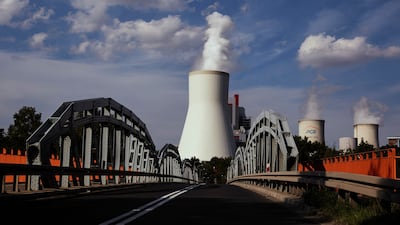Ending the use of coal and replacing it with renewable energy sources will result in an estimated net gain of $78 trillion globally by the end of this century, according to research by the International Monetary Fund.
This amounts to about four fifths of the world's gross domestic product currently, and would be equal to about 1.2 per cent of annual global economic output during the period, the fund said in a blog post.
“The most common concern about scrapping coal is that replacing it with renewable energy would be too expensive, but we show in new research that the economic benefits would far outweigh the costs,” the blog's authors said on Wednesday.
“The benefits from ending coal use come from avoiding damage from climate change and harm to people’s health.”
The IMF research comes at a time when international negotiators are failing to agree on how to phase out coal, partly because of opposition to carbon taxes.
With the Russia-Ukraine conflict raising energy prices, even countries that had been able to abandon the polluting fuel are now reversing that progress as the conflict drags on past the milestone of 100 days.
The fund's cost estimate for adopting renewable sources includes capital spending on new generation capacity equal to what is lost with the shift away from coal, plus compensation to coal companies for lost earnings when they are shut down.
The cost estimate does not include compensation for affected workers, which the IMF said is expected to be small, compared with the overall net gains from the transition.
Additional compensation to make the switch to renewables feasible could be offered, as long as the social benefits of phasing out coal exceed the more comprehensive set of costs.
“So sizeable are the potential gains that world leaders should pursue a global agreement to finance the phase-out of coal as a complement to carbon pricing or equivalent measures that currently don’t fully offset the negative effects of the emissions,” the fund said.
The fund's research shows that ending coal use should not be considered to be too costly as it provides economic benefits linked to the reduction of carbon emissions, such as avoiding physical damage to infrastructure as a result of climate change.
Investments in renewable energy also support economic growth and offer additional benefits from innovation, it said.
“The bottom line for policy is that if compensation was built into an agreement to scrap coal, and if innovative financing packages could incentivise advanced, emerging and developing economies alike to end the fuel’s use, the net social gains from such an agreement would be enormous,” the Washington-based fund said.
In a breakdown of costs for different regions, the IMF showed the that present value of total financing that is conditional on commitments to scrap coal is about $29tn globally, in line with what other studies estimate.
That works out to between $500 billion and $2tn a year, with a front-loaded $3tn investment this decade.
Of the global financing need of about $29tn, the fund estimates that 46 per cent is in Asia, 18 per cent in Europe, 13 per cent in North America, 13 per cent in Australia and New Zealand, 8 per cent in Africa, and 2 per cent in Latin America and the Caribbean.
“Most of the backing can, indeed, come from the private sector, once risks are reduced by sufficient public funds via so-called blended finance, which could mean public funding of around 10 per cent,” the IMF said.
“Broadly speaking, it is in the interest of a government to finance 10 per cent of its country’s total costs to replace coal with renewables, if this amount is less than its resulting social benefits in terms of lower climate damages. A back-of-the-envelope calculation suggests this holds true for nearly all countries.”
Considerations of fairness, a country’s fiscal position, or both, may in certain cases call for foreign contributions to finance 10 per cent of a country’s costs to phase out coal, it said.
In a separate report, the International Energy Agency estimates that about 17 exajoules of energy demand, or about 500 megatonnes, are avoided from coal use, an amount that is about 1.5 times China’s total coal imports in 2021.
This reduction is mainly in the industrial sector as a result of a substitution towards electricity and modern bioenergy, the agency said.
For households alone, enhanced efficiency and related avoided energy demand could help to contribute to reducing global household energy bills by at least $650bn a year by 2030, the agency said.
Without the global energy intensity gains of the past two decades, emissions growth would have been almost double, or about 8 billion tonnes a year higher in 2019, according to the Paris-based agency.
Indonesia remained the world’s largest exporter of coal by weight, while Australia was ranked second, although it remains at the top in terms of energy and economic value, said the agency.
China was the largest importer of coal, followed by India.
“It is sound economic logic to pay for the replacement of coal with renewables to reap a net social gain measuring in the tens of trillions of dollars,” the IMF concluded in its blog post.
“Phasing out coal is not only a matter of urgency for the planet. It also makes economic sense because, as we show, the social gains far outweigh the costs of climate financing to end coal.”


